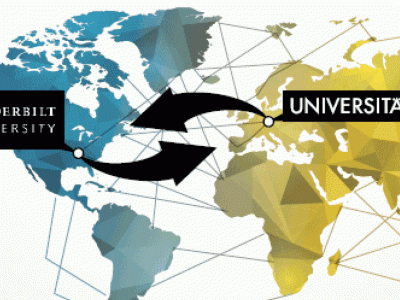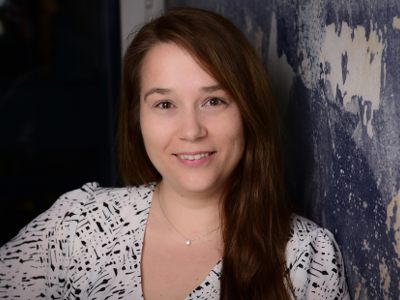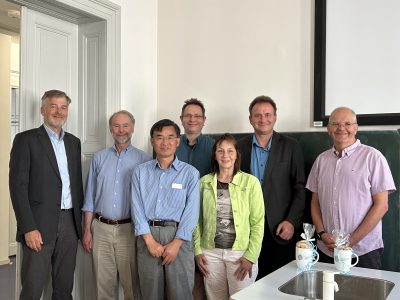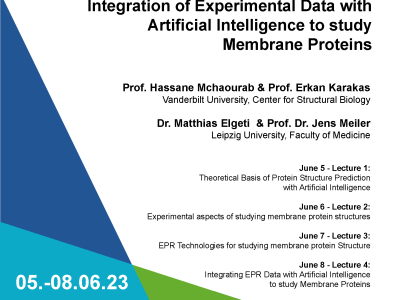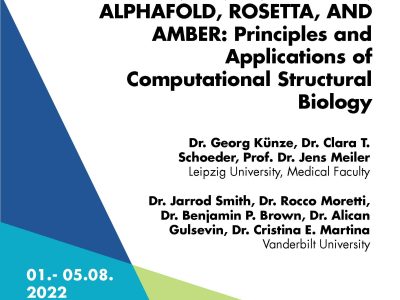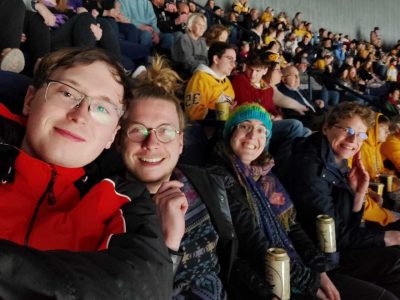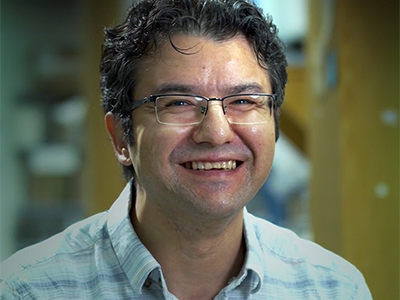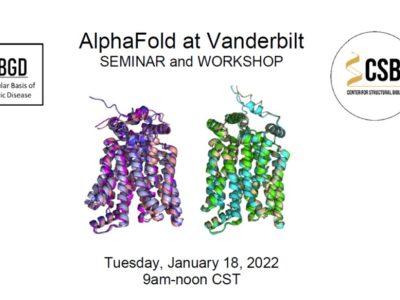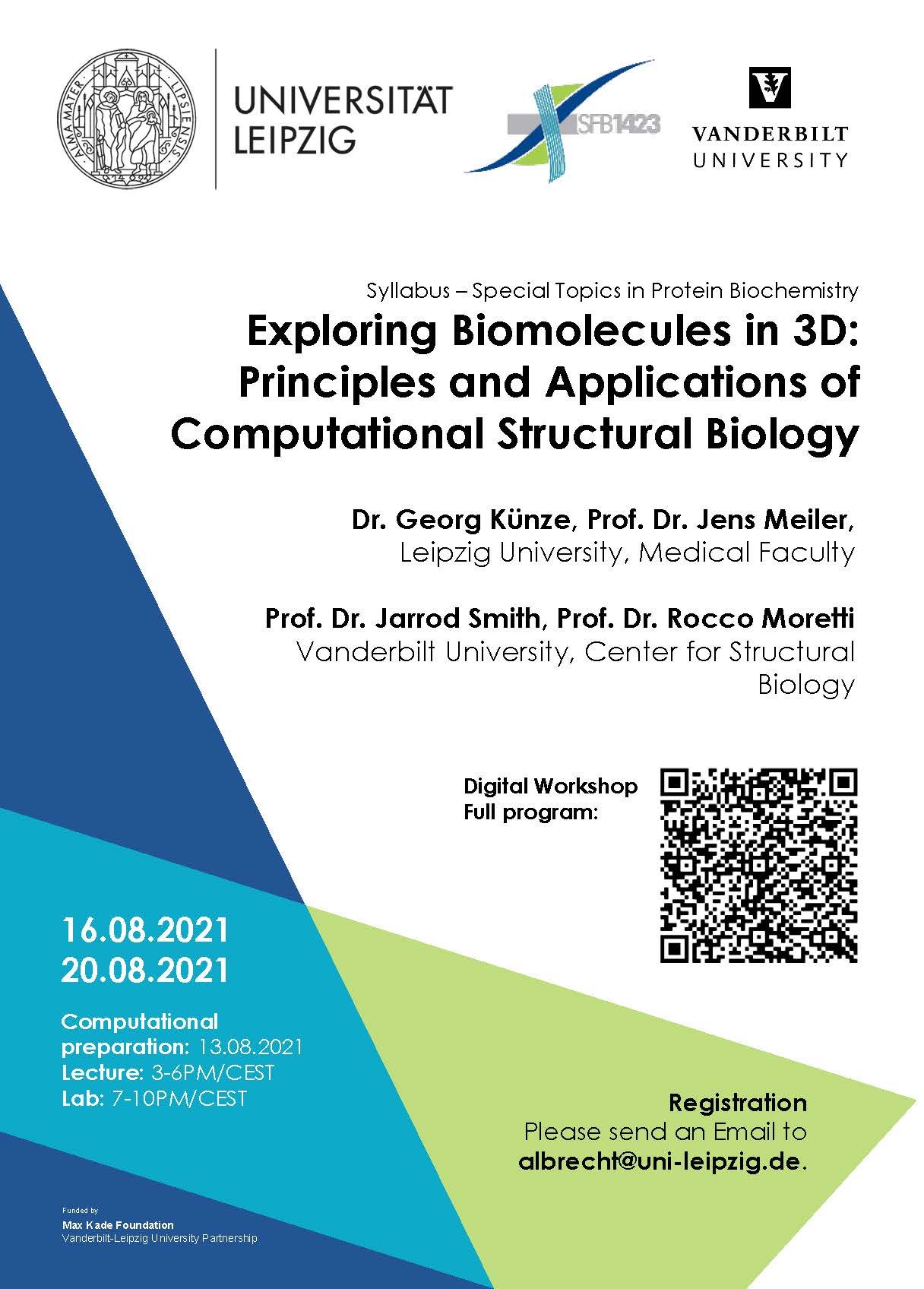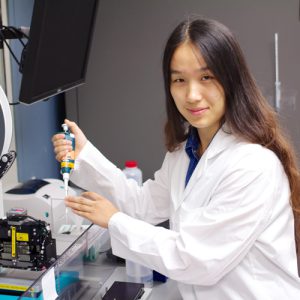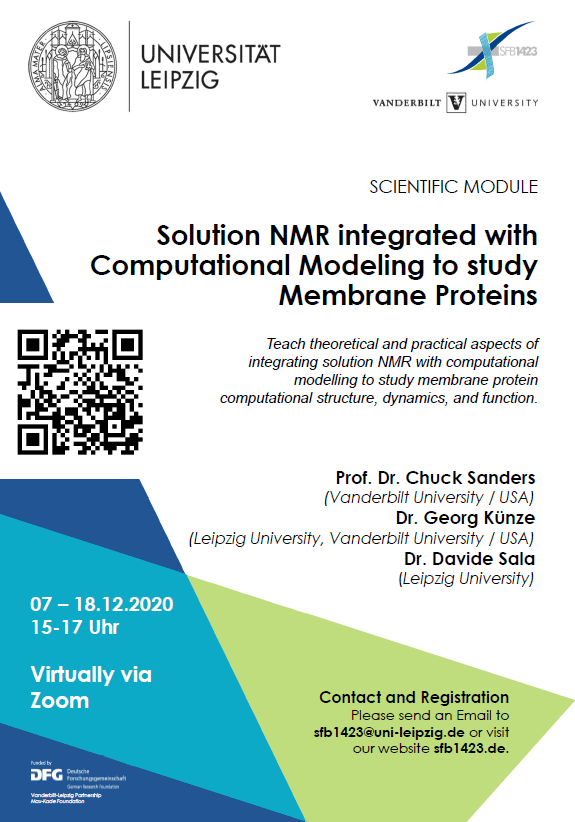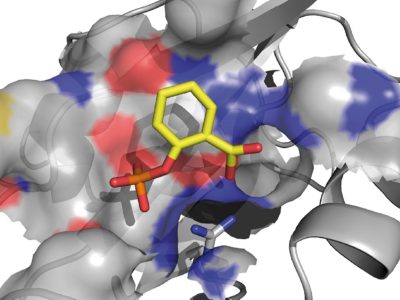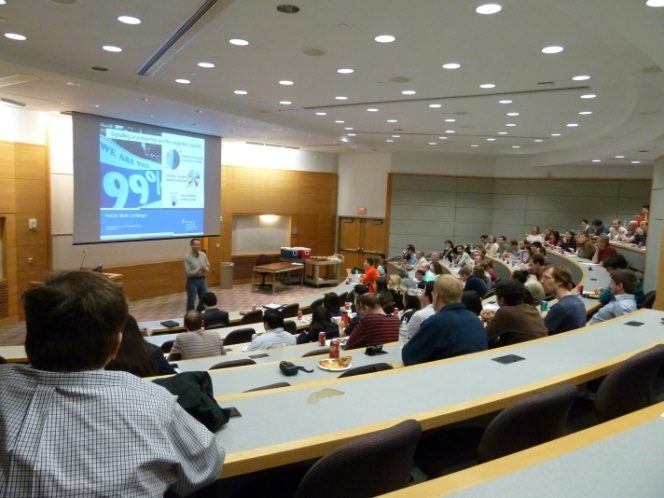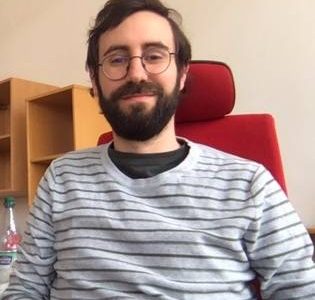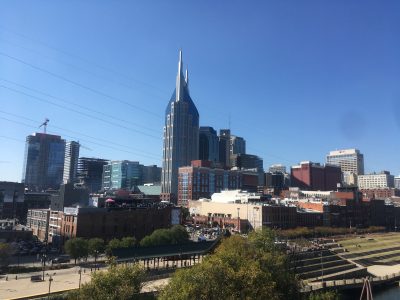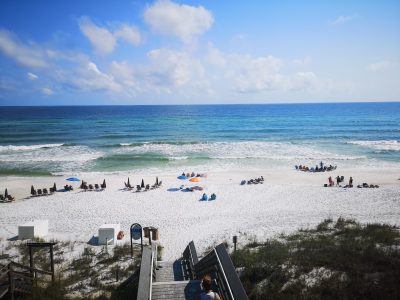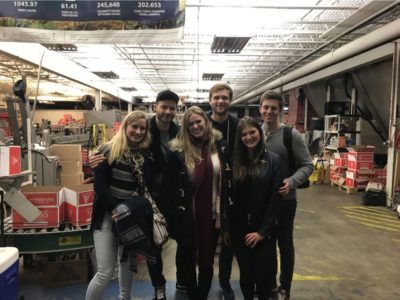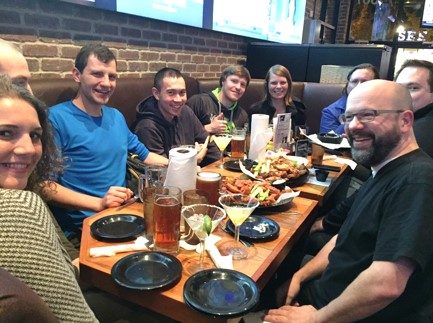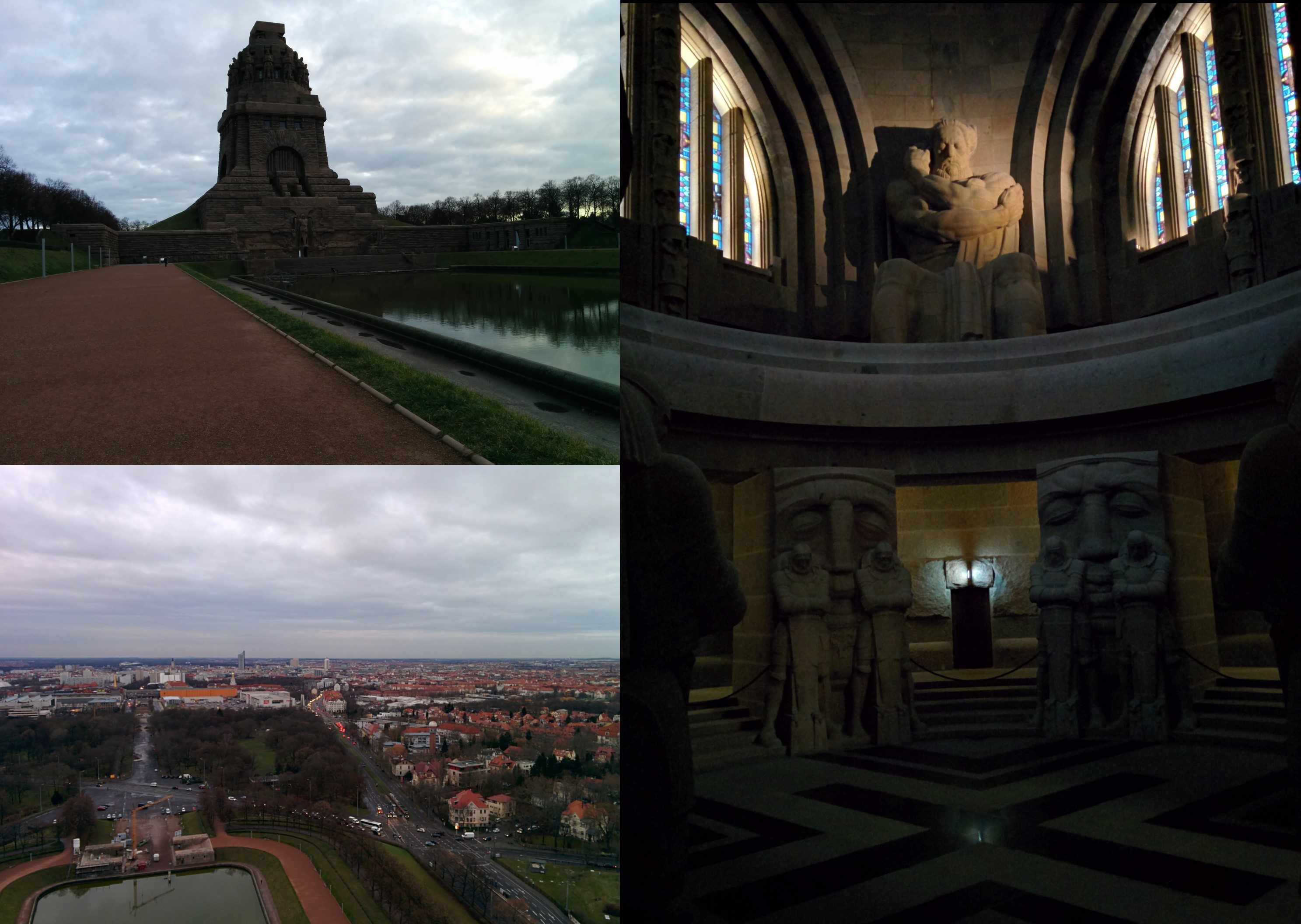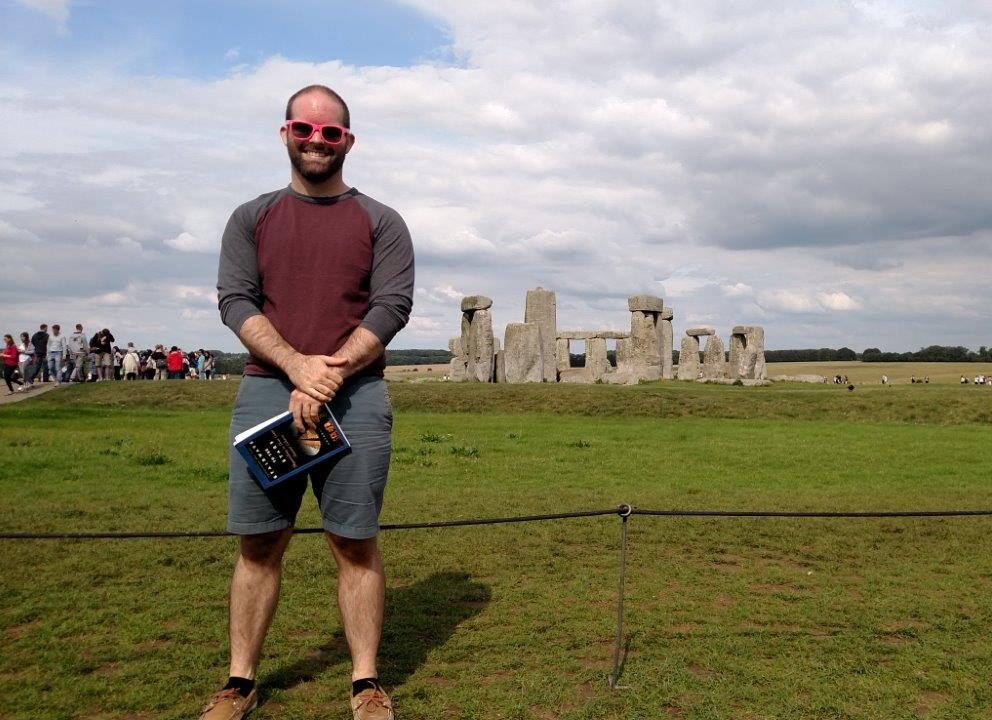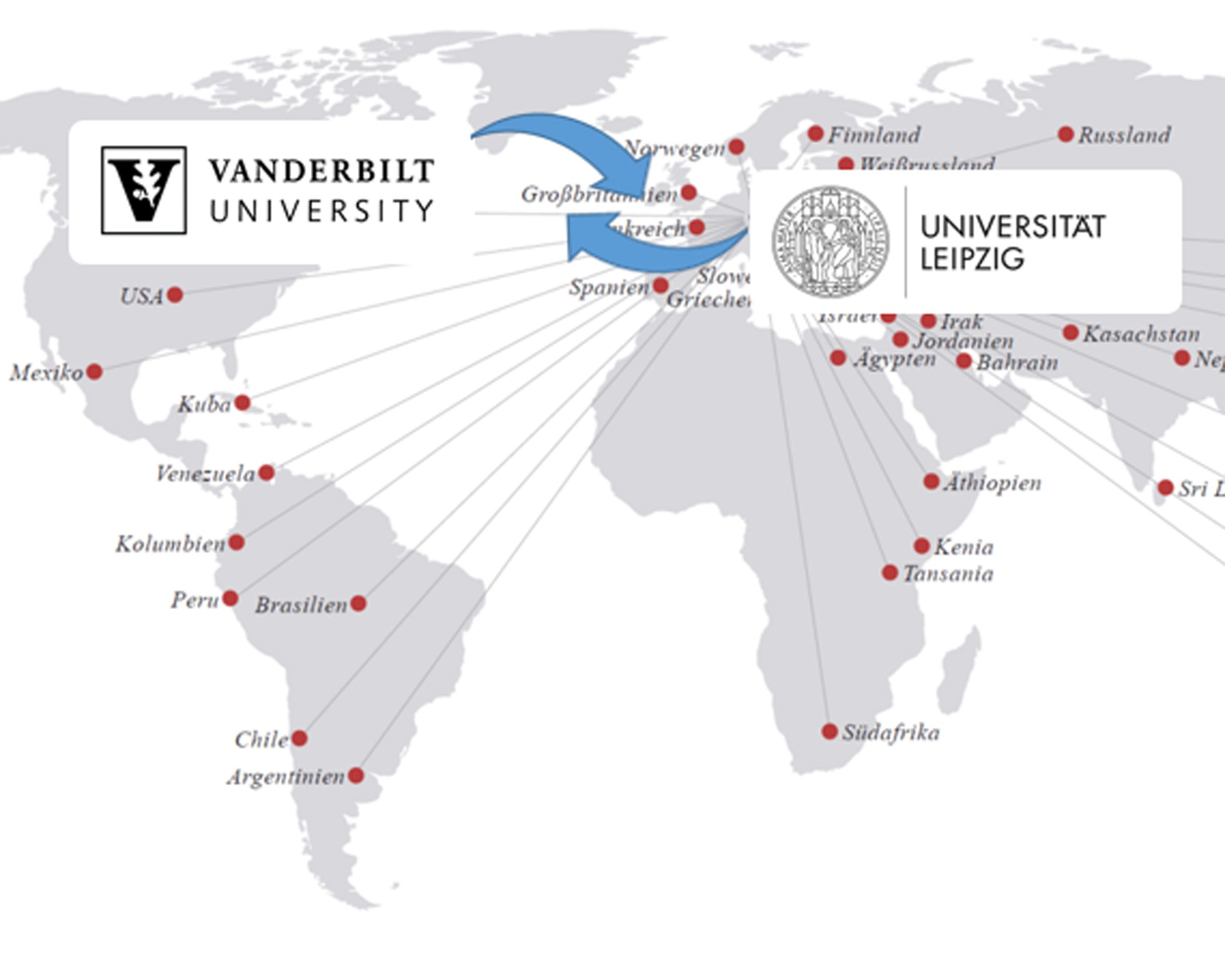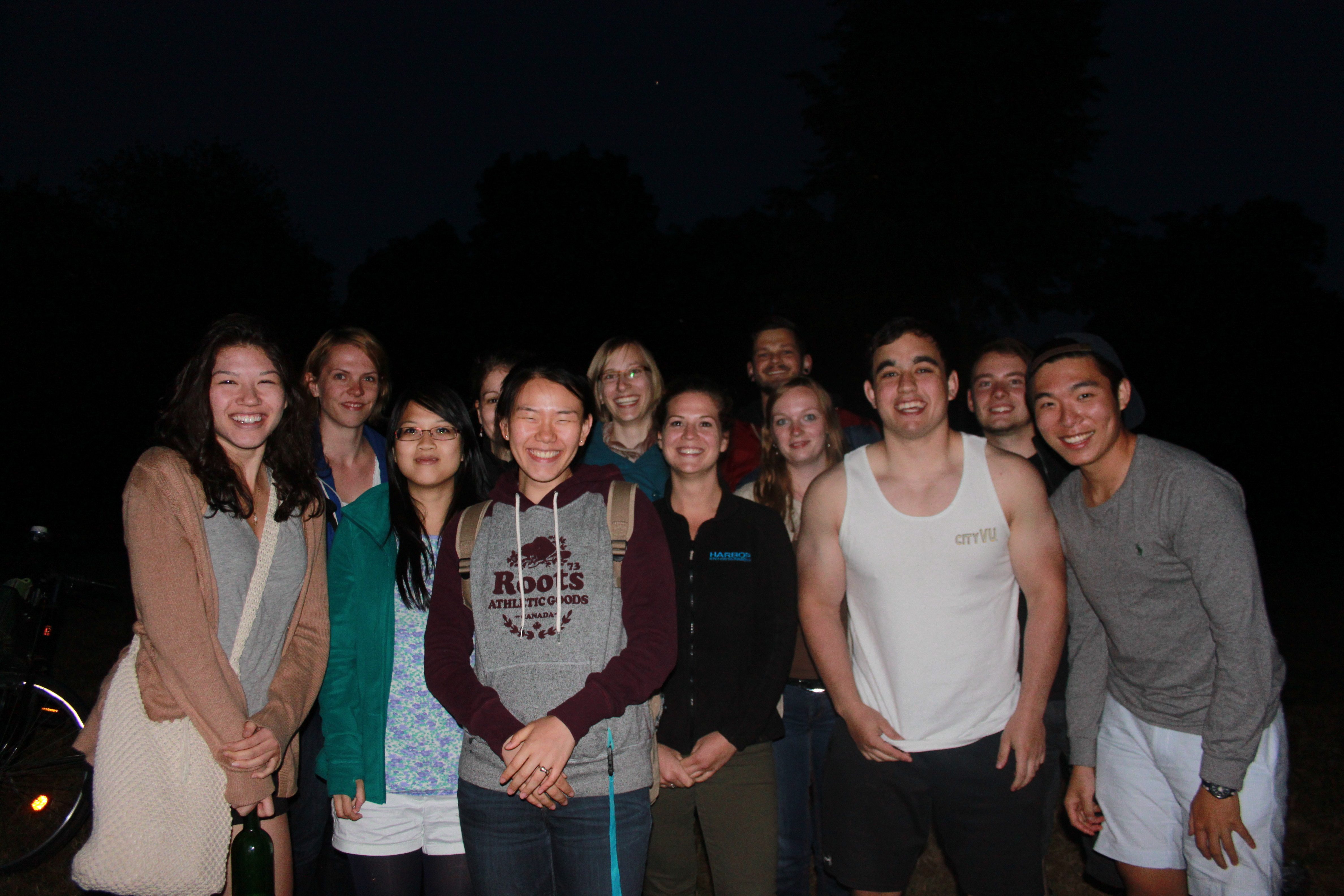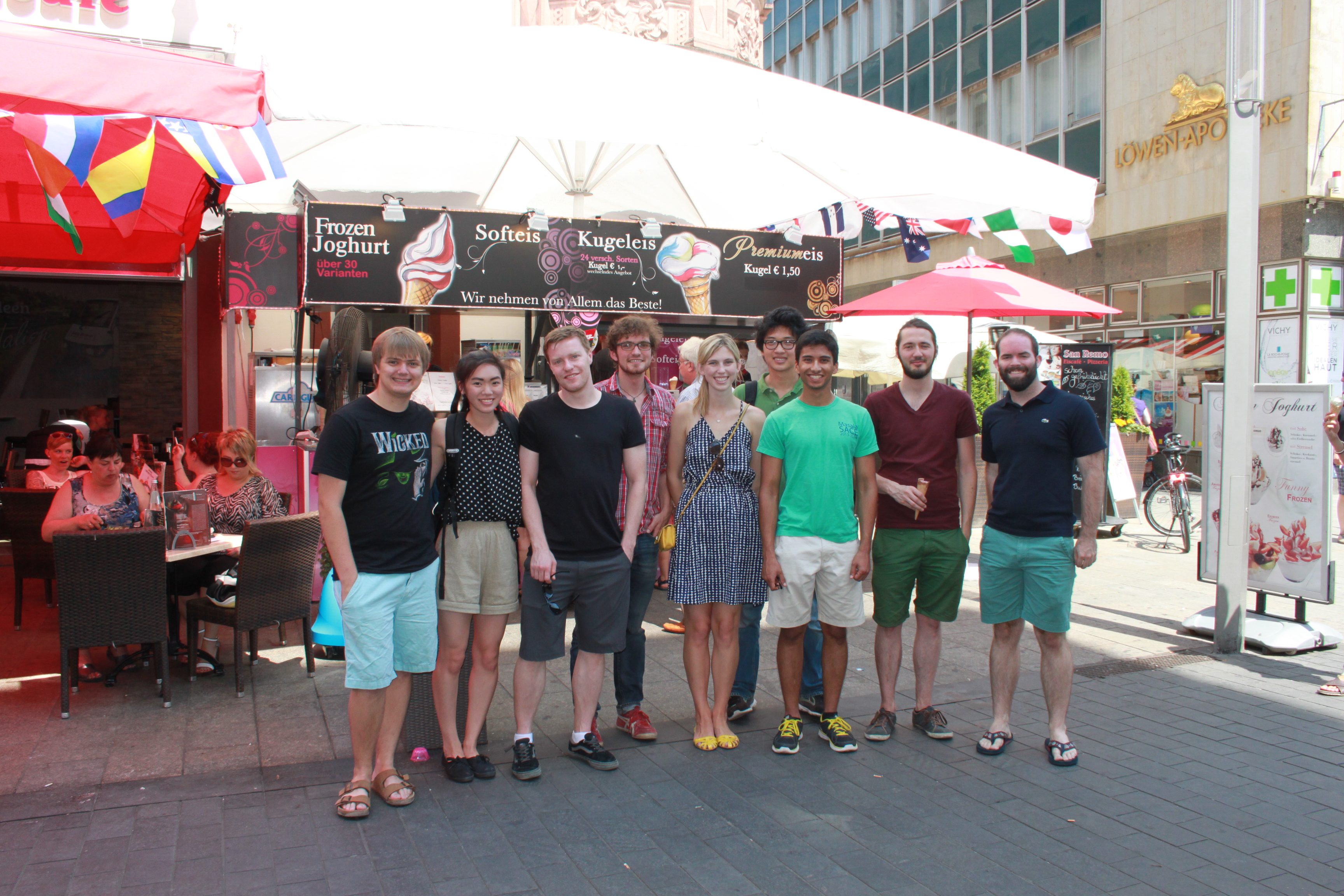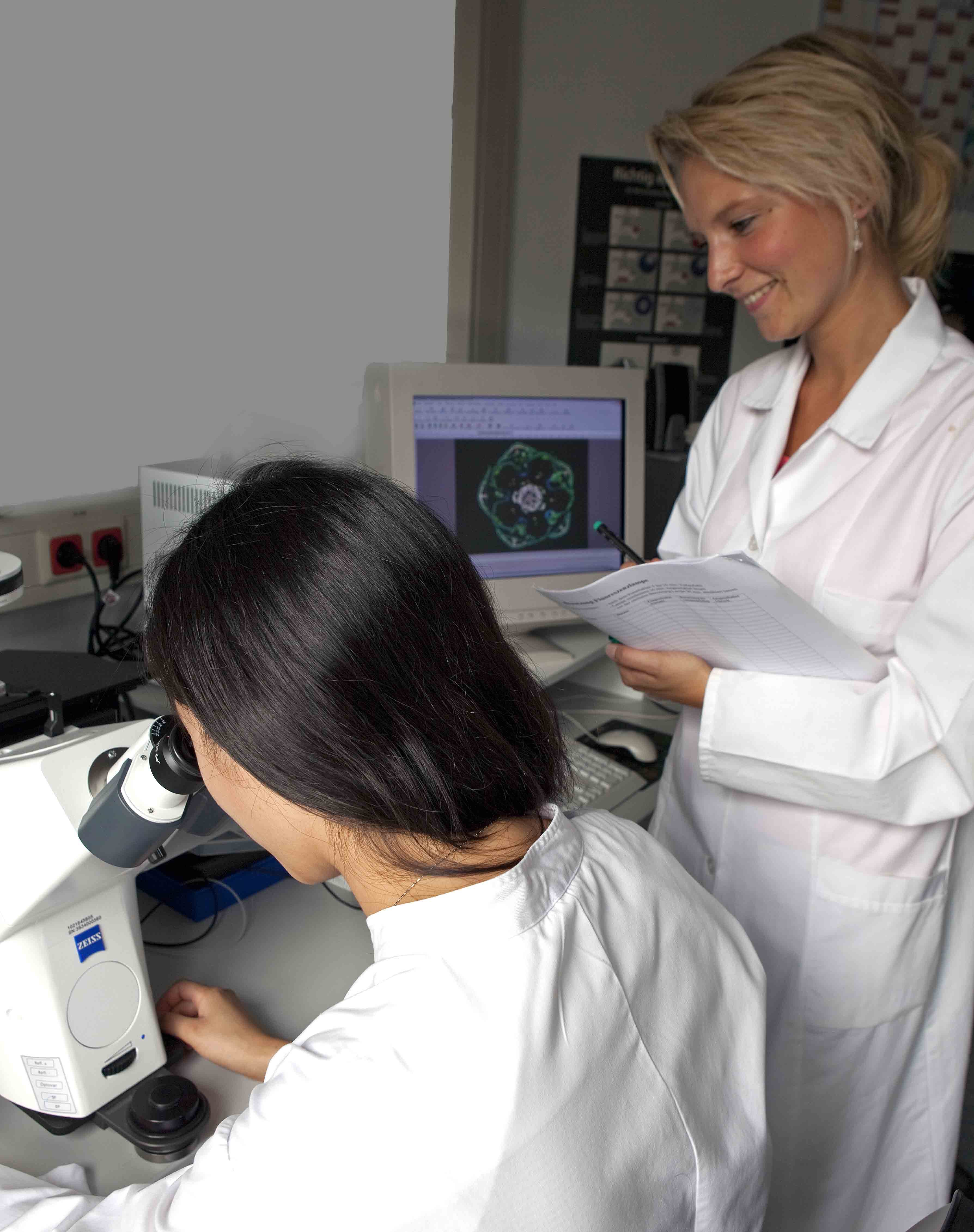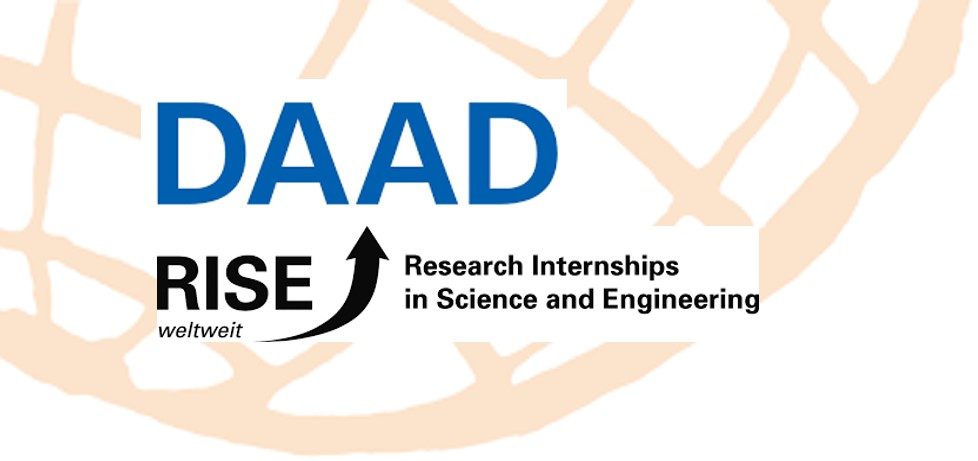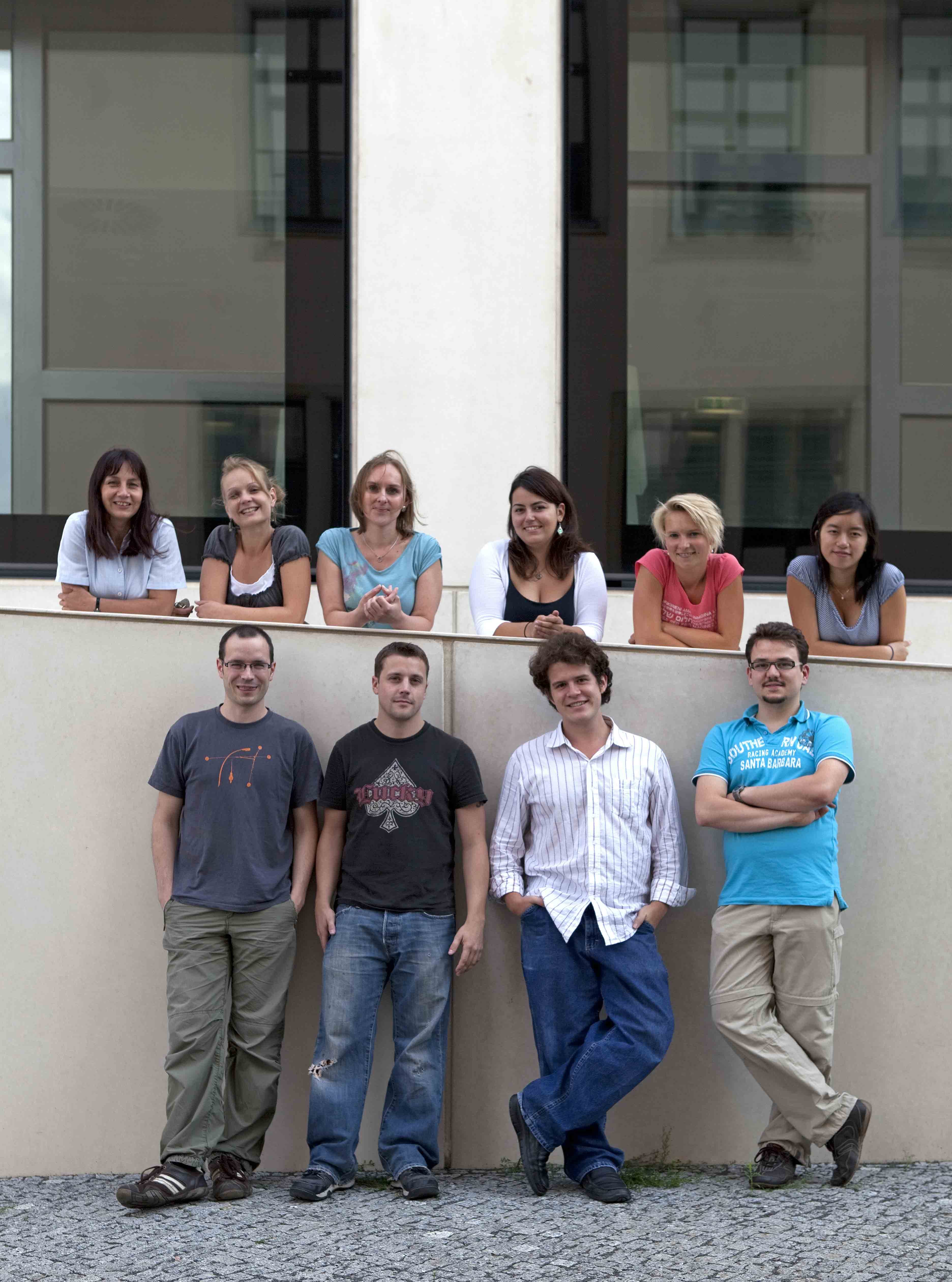We cordially invite you to a one week block online seminar “Computational Design and Directed Evolution of Therapeutic Peptides” by: Prof. Allison Walker, PhD., Prof. Dr. Jens Meiler (Vanderbilt University) Prof. Dr. Annette Beck-Sickinger, Jun.-Prof. Dr. Christina Lamers, Jun.-Prof. Dr. Clara T. Schoeder, Prof. Dr. Leonard Kaysser, Dr. Georg Künze(Leipzig University) DATE16 – 20. December 2024 / 2-6PM COURSE DESCRIPTION Peptides as therapeutics are an emerging class of therapeutics modalities, due to their high binding affinities and specificities. Here we will discuss their characteristics as therapeutic class and give an overview on recent and future developments. Furthermore, we highlight strategies for identification and optimization of peptide therapeutics. We will also cover emerging technologies for structure-based
We offer the possibility to join the lecturer portion of the Vanderbilt University CPBP Course „Modern Methods in structural bioinformatics“ from Aug 12 – 16, 2024 online via Zoom. The course is coordinated by Jens Meiler and Eric Bell, MRBIII at Vanderbilt University and Leipzig University faculty member Georg Künze, PhD, who specializes in GPCR research, will discuss “Molecular Dynamics theory”. DATE AND VENUEAugust 12-16, 2024Lecture portion: 9am-12pm (Nashville time) / 3pm – 6pm (Leipzig time). Lab portion: 1pm – 4pm (Nashville time).MRBIII Room 5131 (morning lecture) and Stevenson Center Room 5119 (afternoon laboratory PROGRAMAug 12, 2024 Fundamentals of protein structure • concepts in deep learning • data representation and databases
The existing Leipzig-Vanderbilt Exchange Program, a 10-year program sponsored by the Max Kade Foundation and Vanderbilt and Leipzig Universities, provides selected students, postdocs and project leaders an opportunity for an 3 month academic experience in the United States or Germany, celebrated its 15th anniversary during the week of August 19 in Nashville. Together with more than 20 project leaders and the academic representatives this international symposium will specifically aim to provide a platform for networking and scientific exchange: by Lab-visits, individual groupmeetings, talks and discussions we will deepen the longstanding scientific collaborations and this will strenghend the bilateral partnership with joint research projects. This partnerschip existence since 2009 and based on
The Meiler lab is hosting a Max Kade Foundation sponsored short course on Friday, March 15, from 11:30am-1:30pm in the CSB conference room (5131 MRB3). Leipzig University faculty member Sandra Berndt, PhD, who specializes in GPCR research, will discuss “Protein Expression and Purification for Structural Studies.” The course will discuss the expression of proteins focusing on the E. coli expression system. Different vectors, promotors, E. coli strains and growing conditions will be discussed. Some topics for trouble shooting will be addressed, like codon usage, posttranslational modifications, and the formation of inclusion bodies. Furthermore, protein purification techniques will be presented. At the end, protein parameters will be summarized, which are important for
On June 9, we invited representatives from Vanderbilt University to Leipzig for a scientific exchange at the first symposium after the corona pandemic. The international scientists of the Vanderbilt Diabetes Research and Training Center talk about kidney-focused and diabetes-related research: Prof. Dr. Roy Zent: “The actin cytoskeleton in epithelial cell repair”Prof. Dr. Ming-Zhi Zhang: “The role of ErbBreceptor family in progressive kidney disease and metabolic syndrome”Prof. Dr. Matthias Blüher: ”Healthy obesity –myth or fact?” Prof. Dr. Raymond Harris: “The role of myeloid cyclooxygenase-2 in kidney injury and adiposity”Prof. Dr. Ambra Pozzi: “Cell penetrating peptide therapy in organ fibrosis”Prof. Dr. Berend Isermann:„Coagulation protease signaling in kidney disease –on the path to new therapies?”
We cordially invite you to a four day block seminar “Integration of Experimental Data with Artificial Intelligence for the Investigation of Membrane Proteins” by: Dr. Matthias Elgeti, Prof. Dr. Jens MeilerLeipzig University, Medical Faculty Prof. Hassane Mchaourab, Prof. Erkan KarakasVanderbilt University DATE05 – 08. June 2023, EST The class will meet in presence and virtually on 4 days in the week from June 5th to June 8th always 9 pm-12 pm . COURSE DESCRIPTION Besides the theoretical basics for the investigation of membrane structures by NMR and EPR, the seminar will focus on integrative AI-mediated analysis, an innovative approach. WHO:Students and doctoral researchers, postdocs, public, for interested parties ROOM: Leipzig University, Faculty of Medicine, Härtelstr. 16-18, Room 018
We cordially invite you to a one week block online seminar “ALPHAFOLD, ROSETTA, AND AMBER: Principles and Applications of Computational Structural Biology” by: Dr. Georg Künze, Dr. Clara T. Schoeder, Prof. Dr. Jens MeilerLeipzig University, Medical Faculty Dr. Jarrod Smith, Dr. Rocco Moretti, Dr. Benjamin P. Brown, Dr. Alican Gulsevin, Dr. Cristina E. MartinaVanderbilt University DATE01 – 05. August 2022, EST The class will meet virtually on 5 days in the week from August 1st to August 5th always 3 pm-6 pm . The laboratory portion will proceed on the same dates 7 pm-10 pm. Additionally, a short introduction to the Linux command line will be offered on the first day. This is a one credit course. COURSE DESCRIPTION Proteins
I took part in the Max Kade Foundation exchange program as a part of my 6 months long diploma, an additional and optional degree when studying pharmacy. Prior to my diploma and my stay in Nashville, research experiences were barely existent, as the study program of pharmacy does not notably focus on that. However, before deciding to pursue a diploma in this field, I made two internships of two weeks each that gave me a rudimentary insight into the wet lab and computational work. Also, first contact with the research field of adhesion coupled G protein receptors (AGPCRs) occured during that time because one of my projects covered the determination of
My PhD research at Leipzig University focus on the Growth Hormone Secretagogue Receptor (GHSR), a receptor in our cell membranes involved in food intake and part of the G-protein coupled receptors (GPCRs) family, key targets of pharmacological drugs. More specifically, I am investigating the conformational changes of this receptor in the presence of its ligand ghrelin or other extra and intracellular partners, using solid state NMR. After having to cancel my exchange for the summer 2020 due to the coronavirus pandemic, I finally had the awesome opportunity to work in the lab of Prof. Dr. Vsevolod V. Gurevich from February to April 2022. The main goal of this exchange was to
As the chemical space is incredibly large with up to estimated 1060 molecules defined as small-molecule ligand, sophisticated and benchmarked methods and pipelines for screening this huge space in a fast and reliable manner are needed. In recent year, virtual ultra-large library screening has witnessed a rapid development with increasing computational power, but also growing available commercial make-on-demand libraries, like the REadily AccessibLe (REAL) libraryof Enamine Ltd. with currently 21 billion chemicals. Pipelines for screening huge databases are available but rely heavily on screening all the compounds. In the Institute for Drug Discovery in Leipzig an in-silico ultra-large library screening pipeline using flexible models of GPCRs was developed, tested, and established.
We would like to invite you to our next VULU Lecture given by Dr. Matthias Elgeti (University of California, Los Angeles & Leipzig University, Germany) about “New biomolecular EPR lab”.
We would like to invite you to our next VULU Lecture given by Prof. Dr. Erkan Karakas (Vanderbilt University, Departmentof Molecular Physiology and Biophysics) about “Structural basis for activation and gating of IP3 receptor calcium channels.”
The Vanderbilt Center for Structural Biology, the Program in Personalized Structural Biology, and the Program in the Molecular Basis of Genetic Diseases will be holding a series of seminars to introduce AlphaFold. These talks will be held on Tuesday January 18, 2022, from 4:00 p.m. CEST (Leipzig time) via Zoom. SpeakersJens Meiler, PhD (Chemistry)Hassane S. Mchaourab, PhD (Molecular Physiology & Biophysics)David Rinker, PhD (Chemistry)Jarrod Smith, PhD (Biochemistry)Rich Stein, PhD (Molecular Physiology & Biophysics)Taylor Jones (Chemical and Physical Biology Program)Diego Del Alamo (Chemical and Physical Biology Program) Topics+ Ramifications and impact of AlphaFold on biomedical sciences+ AlphaFold and the diagnosis of genetic disorders+ Applications of AlphaFold to personalized medicine+ AlphaFold and AlphaFold-Multimer+
We would like to invite you to our next VULU Lecture given by Prof. Dr. Hassane Mchaourab (Vanderbilt University, Departmentof Molecular Physiology and Biophysics) about“EPR in the age of cryoEM: Two recent stories.”
We cordially invite you to a one week block online seminar “Exploring Biomolecules in 3D: Principles and Applications of Computational Structural Biology” by: Prof. Dr. Jens Meiler(Leipzig University, Coordinator)Dr. Georg Kuenze(Leipzig University)Prof. Dr. Jarrod Smith(Vanderbilt University / USA)Prof. Dr. Rocco Moretti(Vanderbilt University / USA) DATE16 – 20. August 2021, EST (13. August 2021 technical setup) The class will meet virtually on 5 days in the week from August 16th to August 20th always 8:00 a.m. -11:00 a.m. CDT / 3:00 p.m. – 6:00 p.m. CEST. The laboratory portion will proceed on the same dates 12:00 p.m. – 3:00 p.m. CDT / 7:00 p.m. – 10:00 p.m. CEST. The laboratory portion on August 13th is indented to sort out
We would like to invite you to our next VULU Lecture given by Dr. Qiuyan Chen (Prof. John Tesmer lab / Purdue University / USA) Title:Structure of the rhodopsin–rhodopsin kinase complex defines the rules of engagement between G protein-coupled receptors (GPCRs) and GPCR kinases
We cordially invite you to a two week block online seminar “Solution NMR integrated with Computational Modeling to study Membrane Proteins” by: Prof. Dr. Jens Meiler(Leipzig University, Vanderbilt University / USA, Organizer)Prof. Dr. Chuck Sanders(Vanderbilt University / USA)Dr. Georg Künze(Leipzig University, Vanderbilt University / USA)Dr. Davide Sala(Leipzig University) DATE07 – 18. December 2020, 3 – 5 p.m. CEST (15:00 – 17:00 Uhr Leipzig). AIMSTeach theoretical and practical aspects of integrating solution NMR with computational modelling to study membrane protein computational structure, dynamics, and function.BASICSBiochemistry, amino acid structure, peptide bond, secondary structure, tertiary structure, biological membrane, protein sensors, protein transporters, protein channelsCOURSE DESCRIPTION The Module includes theoretical and practical aspects of protein sequence alignments, secondary structure
We would like to invite you to our next VULU Lecture given by Prof. Dr. Thorsten Berg, Faculty of Chemistry and Mineralogy at Leipzig University “Small-molecule inhibitors of cancer-related protein-protein interactions“ Protein-protein interactions form the basis of most biological processes, but represent very challenging targets for small organic molecules. The focus of our current research is to develop and apply innovative methods for the efficient design of small organic modulators of protein-protein interactions. These methods are applied for the synthesis and functional characterization of highly potent modulators of pre-selected protein-protein interactions. The presentation will give an overview on our recent work in the following areas: 1) development of selective inhibitors of
Syllabus – CPBP 8330 – Special Topics in Protein BiochemistryCOMPUTATIONAL METHODS TO STUDY PROTEIN STRUCTURE AND DYNAMICS Course Description:Biomolecules undergo constant motions and fluctuations in their native environment. Many of these motions are directly related to function: Channels have to open or close, transporters change their form to conduct molecules and receptors undergo conformational changes to transmit signals through membranes. Despite that obvious dynamics, biomolecules are still commonly considered as rigid entities that exist in one or only few states. This limitation largely prevents understanding of molecular events that are guided or even ruled by intrinsic flexibility such as ligand binding or protein-protein recognition. Molecular dynamics (MD) simulation is a well-established
We would like to invite you to our next VULU Lecture given by Dr. Davide SalaFondazione Sacconi, Milan, Italy Computational investigation of (metallo) proteins structure and dynamics Abstract Proteins that require one or more metal ions to perform their biochemical function are called metalloproteins. To date, metalloproteins are estimated to be one-third of all proteins in most of the organisms and are involved in many fundamental biochemical processes. In this regard, the large diffusion of powerful and cost-effective GPGPU units has allowed the computational exploration of a number of biological processes using techniques based on molecular dynamics (MD). Thus, computational methods as MD can be exploited to investigate metalloproteins structural properties
In the recent years, we pursued the goal to map the binding site of the ligand NPY at human neuropeptide Y5 receptor (Y5R). Therefore, we applied an approach called genetic code expansion to incorporate a photoreactive amino acid at a desired site at the extracellular part of the receptor. The obtained photocrosslinking-data revealed the proximity of several receptor positions to NPY in the ligand-receptor complex. Hence, giving us deeper insights into the receptor-binding pocket. For the visualization of my experimental data in a comparative model, I got the opportunity to perform the computational modeling in the laboratories of Jens Meiler at the Vanderbilt University in Nashville, Tennessee. In the course of
As a Master candidate of the Biochemistry program at Leipzig University I focus on analytics and structural biology. My studies mainly concentrated on performing experiments in the wet lab and I had only little knowledge of Rosetta and scientific programming. During my stay I worked on the computational modelling of G protein-coupled receptors (GPCRs) using the Rosetta homology modelling protocol. GPCRs are membrane proteins, which are crucial for translating extracellular signals into an intracellular response. It has been shown that these proteins are prone to misfolding during insertion into the membrane. During my research I tried to model a proposed misfolded state of the light-sensitive GPCR Rhodopsin[1] and managed to
Johanna K. S. Tiemann1, Prof. Dr. Vsevolod Gurevich2, Dr. Sandra Berndt2 1. Leipzig University 2. Vanderbilt University The aim of my exchange was to deepen the collaboration between the laboratory of Prof. Peter Hildebrand and Prof. Tina Iverson and Prof. Seva Gurevich and to push the project on the investigation of arrestin interactions with SRC family kinases forward. Arrestin is a key intracellular downstream signaling molecule, mediating G protein-coupled receptors and other proteins such as kinases. Those proteins are involved in tumor progression and metastasis, their study, therefore, of noticeable interest. Especially the interaction of arrestin with kinases, in particular, SRC family kinases is so far barely understood. Through the established
Enhancing pathogenicity prediction from structure and evolution with machine learning Currently I am enrolled in a Computer Science Master program at the University of Leipzig. Since my program offers no practical experience in scientific research I was excited when I got offered to participate in the Max Kade Foundation Fellowship. During my ten weeks stay I started a completely new project with the goal to develop a pathogenicity prediction score on point variants in human genes incorporating structural and evolutionary features. Obviously, the scope of this project was way to big to be fulfilled during ten weeks only, so I aimed to collect some data, calculate features and train a machine
I am a PhD student in Leipzig in the lab of Annette Beck-Sickinger. My research focuses on investigation of ligand-binding at a speci c G protein-coupled receptor, the chemokine-like receptor 1. This receptor is involved in multiple in ammatory diseases and therefore is a promising drug target. While we have the possibility to investigate the pharmacology of this receptor here in Leipzig, the lab of Jens Meiler at Vanderbilt offers computational methods to improve understanding of this receptor on a molecularlevel. Hence, I spent 10 weeks in Vanderbilt, where I had the possibility to learn using the software suite Rosetta, which includes a variety of algorithms for protein structure prediction and is
Adhesion G protein-coupled receptors (aGPCRs) are expressed in various cell types, including cells of the immune system and central nervous system. Furthermore, they were reported to be involved in tumorgenesis. Besides their physiological relevance the majority of them have not been functionally characterized in detail. Notably, in contrast to other GPCRs this class of receptors possess an autoproteolytical site within their N-terminus at which they are cleaved. It is known that aGPCRs can be activated by their Stachel-sequence, a short tethered agonist sequence N-terminal of this cleavage site. However, both the binding pocket and the mechanism of its activation remain to be characterized. Using the smallest and noncleaved GPR114 as a
During an internship in the lab of Dave Weaver at Vanderbilt University, I got the opportunity to gain more information about the Y4R, by testing a variety of similar structurally related compounds. I was introduced in the workflow of a high throughput screening laboratory. The technical equipment in the Vanderbilt HTS center makes it possible to test thousands of different chemical compounds in a very short time. Therefore, I learned to perform Ca2+-flux based signal transduction screening assays to monitor the activation of the Y4R. Using this system, I could test new hit compounds out of the ongoing screening for activity and selectivity. Furthermore, I tested structurally similar compounds of a
The objective of our visit was deepening the collaboration between Leipzig University and Vanderbilt University regarding the integration of limited experimental data into protein ensemble prediction. During this visit Axel Fischer presented a method to integrate cross-linking data into protein structure prediction methods at the 5th Symposium on Structural Proteomics in Halle. Following subsequent discussions with Dr. Stefan Kalkhof and Tommy Hofmann, work on an algorithm to efficiently simulate cross-link conformations was continued. In a preliminary study, the algorithm significantly improves the accuracy with which protein structures can be predicted. Additionally, Axel developed an algorithm to integrate solid-state nuclear magnetic resonance (ssNMR) data into the protein structure prediction software BCL::Fold. While
This fall I was awarded the opportunity to return to Leipzig University to work in the lab of Dr. Daniel Huster. This research exchange corresponded nicely with the 11th International NPY-PYY-PP Conference. At the conference I was able to interact with many people in the field of neuropeptide Y (NPY) and its related peptide hormones. At this conference, people from many diverse fields came together to discuss their research. I heard talks on the role of NPY in cancer, obesity, and development of new receptor agonists. This greatly expanded on my knowledge of the physiological role of NPY and its receptors in the brain and throughout the body. One really great
The Max Kade Foundation (MKF, www.maxkadefoundation.org) supports an international research exchange between Vanderbilt and Leipzig Universities. Specifically, MKF provides funds of three undergraduate students from each university to conduct a 10 week summer internship at the respective partner university in 2016 (May – September). The Max Kade Foundation Scholarship Program is open for highly motivated and excellent foreign applicants with a BSc, MSc or equivalent degrees (obtained during the past year). Internship offer in Leipzig for Undergraduate Students at Vanderbilt University (Date: May – August 2016) “Genetic Incorporation of Photocrosslinking Amino Acids: Binding Pattern of β-Arrestins on a Class B GPCR“ Laboratory Principal Investigator: Dr. Irene Coin Graduate Mentor in host
In 2015 eight students on Bachelor- or Master level got the Max-Kade Scholarship to participate in ongoing research projects between Vanderbilt University and the University of Leipzig. Hereby their short research and travel reports are listed… Ryan Xin (Undergraduate Student at Vanderbilt University): Semisynthetic Preparation of Ga Fusion Proteins to Investigate Receptor Interaction (Laboratory of Prof. Dr. Annette Beck-Sickinger & Stefan Ernicke / May-July 2015) In my time at Leipzig University, I learned a great deal from my mentor, Stefan Ernicke, and the rest of the laboratory. Before my internship with the Max Kade Foundation, I had never worked extensively in molecular biology. After my time with the Beck-Sickinger lab, I
written by Wilma Neumann (postdoctoral associate at Leipzig University): Over the last years, the groups of Prof. Evamarie Hey-Hawkins (Institute of Inorganic Chemistry, Leipzig University) and Prof. Larry Marnett (Department of Biochemistry, Vanderbilt University School of Medicine) have developed a very fruitful collaboration, supported by the Leipzig-Vanderbilt collaboration project. Recently, we described a very potent and selective inhibitor of cyclooxygenase-2 (COX-2), a carborane-containing indomethacin analogue, which exhibits a novel binding mode in the COX enzyme pocket (W. Neumann, S. Xu, M. B. Sárosi, M. S. Scholz, B. C. Crews, K. Ghebreselasie, S. Banerjee, L. J. Marnett, E. Hey-Hawkins, ChemMedChem 2015, DOI: 10.1002/cmdc.201500199). In September 2015, I returned to Vanderbilt to continue
The Max Kade Foundation (MKF, www.maxkadefoundation.org) supports an international research exchange between Vanderbilt and Leipzig Universities. Specifically, MKF provides funds of three‐four undergraduate students from each university to conduct a 10 week summer internship at the respective partner university. Travel costs up to $2000 and a weekly stipend of $400 are provided. They target rising junior and rising senior students at Vanderbilt University. To select the recipients of the stipend, they collect research project descriptions from around twenty core laboratories that support the collaboration between Vanderbilt and Leipzig Universities. Descriptions are provided by the graduate student or post‐doctoral mentor who will advise the undergraduate student. It is encouraged that the undergraduate
2014 eight students on Bachelor- or Master level got the Max-Kade Scholarship to participate in ongoing research projects between Vanderbilt University and the University of Leipzig. Hereby there short research and travel reports:
by Tristan Zellmann (doctoral student at Leipzig University): I had the opportunity to stay at Jens Meilers lab in Nashville from 11/27/13 to 12/06/13 as well as from 01/27/14 to 03/22/14 to complete the modeling for an upcoming publication. During my stay, I had the opportunity to take part in two great, american traditions – arriving the day just before Thanksgiving, I got invited to an actual Thanksgiving dinner, featuring delicious turkey, mashed potatoes, gravy, buttery carrots and even pumpkin pie. Another culinary and cultural highlight was a super bowl party complete with chili, buffalo wings and lots of snacks, even if the Seattle Seahawks seemed to dominate a bit too
by Lizzy Wanka (doctoral student at Leipzig University): In the autumn of 2013, I had the great opportunity to visit Prof. Dr. Vsevolod V. Gurevich`s lab at the Vanderbilt university for 12 weeks. Prof. Gurevich and his group work with arrestin proteins and investigate among others their binding to receptors and other signaling proteins. I wanted to study the binding of different arrestin mutants to NPY receptors and NPY receptor chimera. Together with Dr. Luis E. D. Gimenez, I performed various bioluminescence resonance energy transfer assays and learned a lot about the arrestin recruitment and the optimization of this assay. The discussions about analyzing the data were revealing and very helpful.
by Stephan Theisgen (Post Doc at Leipzig University): From 16th September to 14th October I had the opportunity to visit Prof. Jens Meiler’s Lab where I wanted to perform some structural computations to complete a pending scientific paper. This turned out to be a major task for 4 weeks only. But together with Dr. David Nanneman, Stephanie Hirst DeLuca and Sam DeLuca, we managed to finish this ambitious project successfully. In the process, I learned a lot about computational structural biology and became familiar with an important method in this field. Beside the heavy scientific work, I enjoyed very much the special southern cuisine, visiting downtown Nashville and of course some
by Hannah Berke (undergraduate student at Vanderbilt University): My two months spent in Leipzig were a wonderful experience. The work in the lab was informative and enjoyable and living in Leipzig changed my life. My stay in Leipzig was extremely fun and gave me the opportunity to travel and experience Europe and Germany specifically. The city itself is a perfect size, very similar to Nashville, and I lived in an area that was about a 5 minute tram ride or 20 minute walk from the city center, or “Mitte,” that is full of shops and restaurants. The abundance of parks and cafes made it easy to spend time outside – barbecuing,
Stephanie and Liz are graduate students in the Meiler Laboratory at Vanderbilt University. They both work on the computational investigation of GPCRs and their interactions with various ligands. They recently took the opportunity to do a month-long research internship at Leipzig University in conjunction with their collaborators, who perform the wet-lab experiments associated with the proteins they model. Herein, they reflect on their experiences. Liz Dong: For 4 weeks, I worked with the lab of Dr. Torsten Schöneberg on a project involving P2Y12, a receptor involved in platelet aggregation. My part of the project was to build a model of P2Y12 using Rosetta and dock known ligands into the model to
Liz Dong of the Jens Meiler lab at Vanderbilt recently received a short term research grant to study at the Univeristy of Leipzig in Leipzig, Germany. She will spend one month this fall developing a computational method that will allow for the binding pose of a drug within a receptor to be determined. Her method will be guided by experimental data collected on drugs that bind G-protein coupled receptors, working with the lab of Torsten Schöneberg. Congrats, Liz!
The German Academic Exchange Service (Deutscher Akademischer Austauschdienst, DAAD) announced a new call for its program “Research Internships in Science and Engineering” (RISE) for summer internship in 2011. The program works in both ways. German and American Ph.D. students submit internship offers for undergraduates students for a duration of 6 to 12 weeks. German bachelor students can work as research interns at U.S. universities and U.S. undergraduates can work in labs of German universities. The DAAD provides stipends to help cover living expenses, the partner universities and research institutes provide housing assistance. The call is applicable for all fields of biology, chemistry, physics, earth sciences and engineering. Please visit for further
The German Academic Exchange Service (Deutscher Akademischer Austauschdienst, DAAD) offers since 2005 a yearly program that gives undergraduates from U.S., Canadian and U.K. universities the opportunity for a research internship during the summer holiday weeks. In 2010 four students from Vanderbilt University used the collaborative efforts of the partnership to visit work groups in the fields of biochemistry (AG Beck-Sickinger), medicinal physics and biophysics (AG Huster), and environmental technology andmanagement (Prof. Holländer) to get a hands-on experience of the research at Leipzig University. They stayed 8 to 12 weeks here learning new methods and techniques as well as getting in touch with life in Germany. All of them enjoyed their stay

